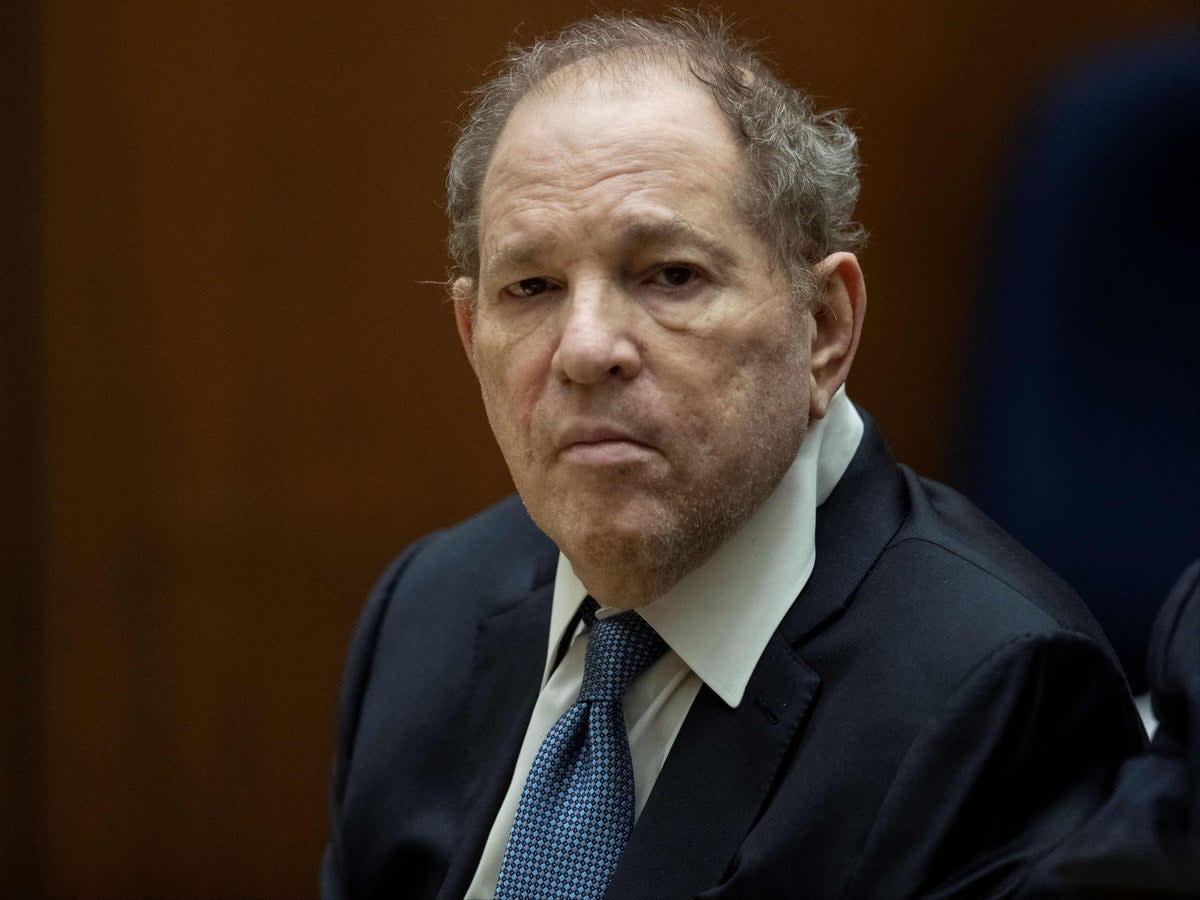Harvey Weinstein is fighting to appeal his 2020 rape conviction. What’s at stake?

Harvey Weinstein’s legal team is heading back to the courtroom to argue an appeal of his 2020 criminal conviction, a landmark moment in the #MeToo movement, in New York.
The former movie producer’s lawyer will speak on Wednesday at the Court of Appeals of the State of New York – the state’s highest court – in an effort to overturn the existing verdict.
Here is everything you need to know about today’s oral arguments:
What was Weinstein convicted of and what was his sentence?
This new hearing pertains to Weinstein’s conviction in New York in February 2020 on two counts: one count of criminal sex act and one count of third-degree rape. The conviction came as the conclusion to a high-profile trial, during which Weinstein was accused of multiple sex crimes. A jury acquitted him on two charges of predatory sexual assault.
Weinstein was sentenced in March 2020 to 23 years in prison.
As soon as Weinstein was convicted, his legal team signaled their intent to appeal the verdict. “As sure as I’m a bald man, we will be appealing,” his lawyer Arthur Aidala said at the time.
The criminal sex act conviction related to Weinstein forcibly performing oral sex on Miriam Haley, a woman who worked as a production assistant, in 2006. The third-degree rape conviction related to him assaulting Jessica Mann, then an aspiring actress, in 2013.
Weinstein has also been convicted in a separate case in California. In December 2022, he was found guilty of forcible rape, forcible oral copulation, and penetration with a foreign object. He was sentenced to 16 years in prison (additionally to his New York sentence).
Who’s speaking at the Court of Appeals and for how long?
Aidala, one of Weinstein’s defense lawyers during the 2020 New York trial, will have 20 minutes to argue Weinstein’s case on 14 February, according to the court’s schedule.
Steven C Wu, the Chief of Appeals at the Manhattan District Attorney’s office, will then have 20 minutes to respond.
Oral arguments at the Court of Appeals start at 2pm, but multiple cases will be heard prior to Weinstein’s, which is the last on the list. Aidala is expected to start speaking between 4pm and 4:30pm.
The oral arguments will be streamed online and can be watched here.
What’s at stake?
An intermediate appeals court previously upheld Weinstein’s conviction in New York, back in June 2022. The Court of Appeals is the state’s top court, meaning he has already exhausted other legal avenues to get here. This is Weinstein’s last stop on his direct appeal as far as state law is concerned.
A decision is not expected to be made on 14 February.
Should the Court of Appeals deny his petition, Weinstein could in theory take his case to the US Supreme Court, under certain conditions, though it would be up to the US Supreme Court whether it takes it up or not.
Will Weinstein be there?
Defendants are not required to attend oral arguments for an appeal. If they’re imprisoned – as is the case for Weinstein, who is serving is New York sentence at the Mohawk Correctional Facility in Rome, New York, about 100 miles from Albany, where the Court of Appeals is located – they typically do not attend.
What is Weinstein’s legal team arguing?
Weinstein’s conviction was a landmark in the #MeToo movement. His legal team is now arguing that the judge in his case “[succumbed] to the pressure” of the movement and denied Weinstein a fair trial, according to The Associated Press.
Specifically, Weinstein’s lawyers are taking issue with the use of “prior bad act” evidence – meaning evidence pertaining to behavior other than the behavior at the center of the charges themselves. Such evidence can be used under certain rules.
When the intermediate appeals court upheld Weinstein’s conviction in 2022, it found that Judge James Burke, who presided over Weinstein’s criminal trial in 2020 and decided which types of evidence would be allowed, had made proper use of his discretion, the Associated Press reported at the time.
Weinstein’s legal team has also taken issue with Burke’s decision not to remove a juror who had written a novel about “predatory older men”. They have also questioned Burke’s decision to allow the prosecution to present expert testimony on rape and misconceptions around sexual assault, while not allowing the defense to do so. On those points too, the intermediary court sided with Burke.
Cyrus Vance Jr, who served as the Manhattan District Attorney during Weinstein’s prosecution, has stood by Burke and the case. When the intermediate court upheld Weinstein’s conviction two years ago, Vance told The Associated Press: “I am also grateful this decision by the appellate court fully credits the powerful testimony of the brave and strong survivors of Mr Weinstein’s abuse. Today, they are one step closer to full closure of the legal process, which they deserve.”

